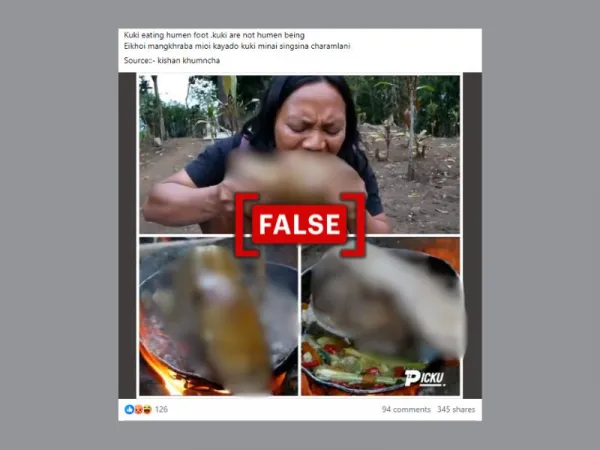By: Chandan Borgohain
July 23 2024
 A social media post has falsely shared visuals of an Indonesian food vlogger as evidence of Kukis ‘eating human meat in Manipur’. (Source: Facebook/Screenshot/Modified by Logically Facts)
A social media post has falsely shared visuals of an Indonesian food vlogger as evidence of Kukis ‘eating human meat in Manipur’. (Source: Facebook/Screenshot/Modified by Logically Facts)
The original video, uploaded on YouTube in August 2023, shows an Indonesian YouTuber eating a local delicacy, not human flesh.
What is the claim?
A set of images seemingly showing a large chunk of meat being cooked and consumed by a person has been circulating on Facebook, accompanied by a claim that it shows a Kuki man "eating human flesh" in the conflict-torn Northeast Indian state of Manipur.
The caption of the post, partially written in English and the locally spoken Meitei language, reads, “Kuki eating humen foot, kuki are not humen being. Missing persons belonging to the Meitei community may be eaten by the Kukis (sic).” An archived version of the post can be seen here.
Screenshot of the viral Facebook post. (Source: Facebook/Screenshot/Modified by Logically Facts)
The ethnic clashes between the Meitei community and the Kuki tribe broke out in May 2023 in Manipur have led to the deaths of over 200 people and thousands have been displaced.
However, we found that the viral images are not from Manipur, but from a YouTube video by a popular Indonesian food vlogger.
What did we find?
A reverse image search led us to a more than 20-minute long YouTube video (archived here) uploaded on August 14, 2023, by a verified channel named "dede inoen". The video follows a man as they wander through a wooded area and cook a large piece of meat in the wilderness.
At the 16:59 timestamp of the video, we can see the frame that clearly matches the viral image showing the man eating the meat. Additionally, the image in the bottom left of the viral post can be seen at the 13:30 mark, while the image in the bottom right can be seen at the 11:12 mark of the video.
We translated the title of the video using chatGPT, which said that the phrase "TONGSENG KAKI KUNTILANAK KUAH SANTAN" translates to "Tongseng (a type of Indonesian spicy curry) of Kunti's leg in coconut milk broth."
Logically Facts contacted Indonesian fact-checking organisation Mafindo to understand what the person the video is consuming. Septiaji Eko Nugroho from Mafindo told us that the “video and the caption explain that this food is from cow tongue, which is common in Indonesia as a specialty.”
What about the vlogger?
The YouTube channel, created on May 29, 2018, is based in Indonesia, and has over 5.12 million subscribers. We reviewed the YouTube channel and found that it regularly shares eccentric and extreme videos of "Mukbang" and surviving in the wild. "Mukbang" is an audio-visual broadcast where a person eats a large quantity of food in front of the camera, usually live-streamed.
We found that the content creator, Dede Inoen, is equally popular on social media, with over one million followers on Instagram (archived here) and 234,000 followers on Facebook (archived here).
We also found several reports that feature Dede Inoen as a content creator who usually makes extreme food-eating videos. According to an article published in March 2022, Dede hails from Cianjur in West Java, Indonesia, and often garners attention for his eating videos.
This evidence shows that the person in the viral image is an Indonesian food vlogger, and not a Kuki man as claimed.
The verdict
The viral images are taken from a YouTube video by a popular Indonesian vlogger and it doesn’t show a Kuki person from Manipur consuming "human meat".